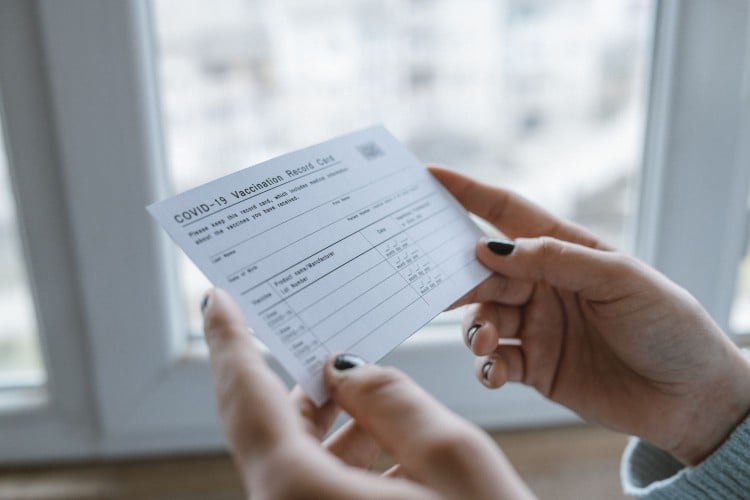Do You Still Need Your COVID-19 Vaccination Card?
- The CDC said it will no longer distribute COVID vaccination cards, which were once a ticket to resuming in-person activities in 2021 and early 2022.
- People can keep their vaccination cards as a personal medical record, and can get them updated at their next COVID shot appointment, experts said.
- The old cards are no longer required, however, and people can access their vaccination history via state agencies or healthcare providers if necessary.

ArtistGNDphotography/Getty Images
In the early days of the COVID-19 vaccine rollout, proof of vaccination was oftentimes necessary if a person wanted to eat in a restaurant, go to major sports arenas, or work in person. But now, those once-crucial COVID vaccination cards are no longer being printed, the Centers for Disease Control and Prevention (CDC) announced.
The agency shared the information online Wednesday via an updated version of their FAQs page on COVID vaccines.
“CDC no longer distributes the white CDC COVID-19 Vaccination cards and does not maintain vaccination records,” the website said.
In lieu of the cards, the CDC encouraged people to reach out to their state’s immunization information system (IIS), which can provide a copy of a person's full vaccination history, including COVID vaccines.
Though vaccination cards have become obsolete as Americans have adapted to post-pandemic life, they’re still an important medical record. Plus, COVID shots aren’t going anywhere—just last month, the CDC recommended that everyone six months and older get an updated COVID shot this fall.
So what should people do with their vaccination cards? Here’s what infectious disease experts had to say about the CDC’s announcement, and whether Americans still need to keep a log of their COVID shots going forward.
Why Did the CDC Stop Giving Out Vaccination Cards?
The decision to stop printing the white vaccination cards has a lot to do with changes in how the shots are being distributed this fall.
COVID vaccines were once distributed through the federal government, but are now sold directly through manufacturers. The government is no longer printing the white cards as a result, a CDC spokesperson said.
The timing makes sense too, said William Schaffner, MD, professor of infectious diseases at Vanderbilt Medical Center.
“We have moved past the COVID-19 public health emergency,” he told Health. “This is also the first updated vaccine, and the CDC is trying to get people to think about it as part of their routine fall immunization.”
Not handing out a vaccine card puts the COVID shot more in line with other common vaccines—people don’t get a special card when they get their flu shot, for example, said Schaffner.
There also just isn’t a need for a COVID vaccination card anymore, John Sellick, DO, professor of medicine in the division of infectious diseases at the University at Buffalo, told Health.
“The main use of those cards was to see who was vaccinated, so you could do certain activities,” he said. “Now, all of that has gone away—you don’t need a vaccination card to go to a bar anymore.”
2023 Fall Vaccines: When to Get Vaccinated for COVID, Flu, RSV
Should People Keep Their Proof of Vaccination?
Even though these COVID vaccination cards aren’t as necessary as they once were, there may be a few reasons that people may want to keep theirs.
The vaccine card can be a way for people to keep track of the COVID vaccines they’ve had, Schaffner said. For what it’s worth, Schaffner said he’ll be keeping his, just in case.
Additionally, the vaccination cards may be useful to have on hand when traveling.
“Anyone who travels internationally may want to keep their card, just in case,” Sellick added. “While many countries have dropped their COVID vaccination requirements, there may still be a reason to have it in some countries.”
Beyond logistics, some people may want to keep their old COVID vaccination card as a sort of relic of pandemic life.
But in general, deciding whether to keep or toss a vaccine card is a personal decision—it’s certainly not required, Schaffner said.
If someone does need proof of vaccination after they’ve gotten rid of their card, they can get a copy of their vaccination records from their doctor or state health agency if necessary, said Sellick.
What To Eat Before (And After) Your Booster Shot
What Vaccine Appointments Will Look Like Without a Card
With the CDC’s decision, vaccination cards likely won’t play much of a role in people’s COVID vaccine appointments going forward.
The newly-updated COVID vaccines are available for anyone regardless of their COVID vaccine history—so whatever is (or isn’t) on a person’s card doesn’t matter.
“The dosing is the same, whether you had the vaccine in the past or not,” said Schaffner. “The CDC isn’t calling it a ‘booster’ anymore—they don’t want you to count how many you’ve had in the past.”
That being said, if someone does want to bring their old vaccination card along, the person who administers the vaccine will likely update it, Sellick said. Both CVS and Walgreens said they will update COVID cards if people bring them in, but they’re not required for vaccination.
Even if people don’t have a vaccination card to be updated at their next vaccine appointment, the pharmacy should still provide information and a record of their latest COVID shot.
“You can still expect to receive a paper or electronic factsheet with information about the COVID-19 vaccine you received,” a CDC spokesperson told Health. “Each approved and authorized COVID-19 vaccine has its own fact sheet with information to help you understand the risks and benefits of that vaccine.”
Overall, experts agree that the change isn’t anything to stress about—vaccination cards have simply shifted from a tool to manage the pandemic to a personal health record.
“Some people will be nervous about this,” Sellick said, “but it’s not the end of the world.”
What Are the Symptoms of the New COVID EG.5 'Eris' Variant?
